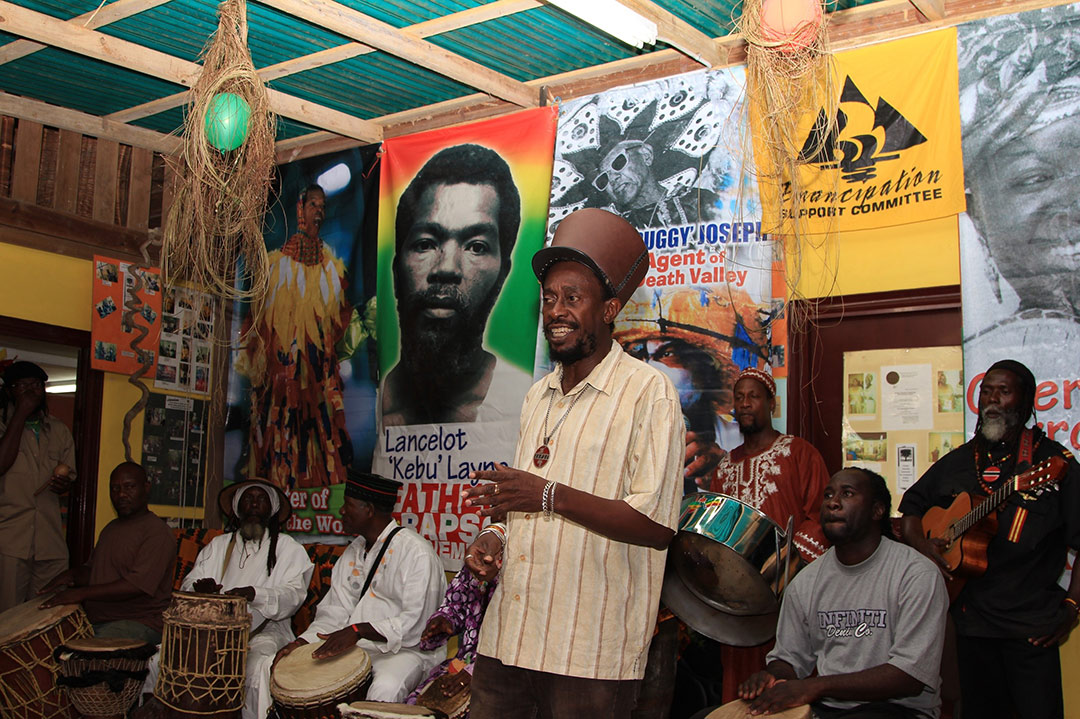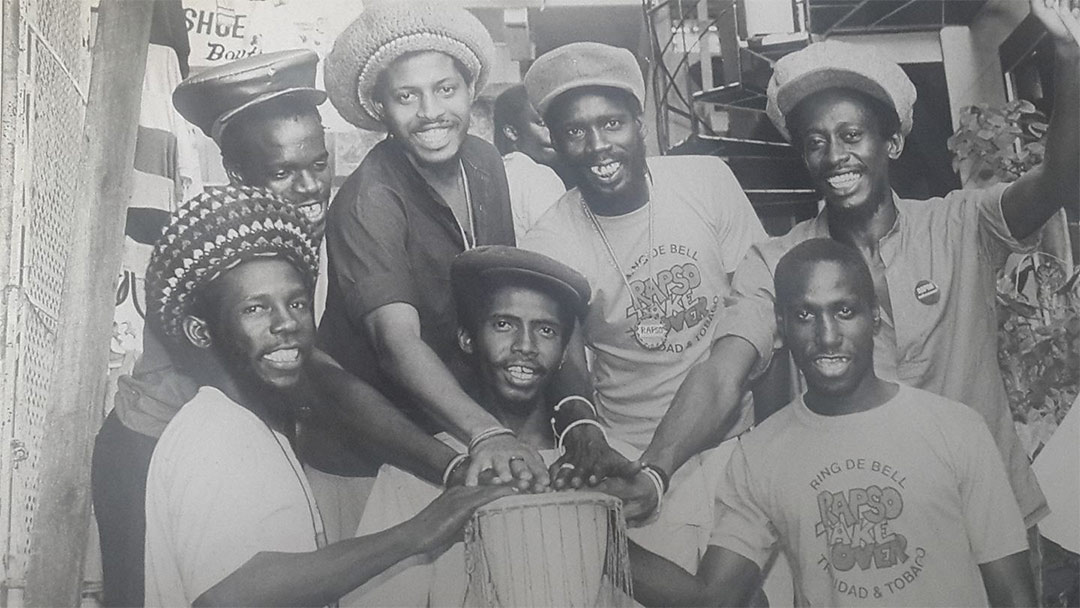Dis is de spirit of rebellion
De fire dat blaze in de heart of the youth
De sound of price and determination
In de heartical search for de truth… Rapso
Rapso is de attitude as we rock against the colonial order
To create a new vibration for us all in de region… Rapso
Brother Resistance (Quoted in Moonsammy 2010)
Lutalo Masimba also known as Brother Resistance (1954-2021) was most known as a pioneer of the Rapso tradition, a militant musical tradition, he described ‘de power of de word in the riddim of de word’. With his seriousness of purpose and cutting edge bold lyrics in many ways he was reminiscent of Mutabaruka, Amiri Baraka, and Linton Kwesi Johnson. Brother Resistance was not only a gifted poet and performer but was also a past president of the Copyright Organisation of Trinidad and Tobago, past president of the Writers Union, the sitting president of TUCO (Trinbago Unified Calypsonians’ Organisation), a Commissioner of the National Carnival Commission board, an entrepreneur, an award-winning DJ, a published author, and an award-winning actor. In celebration of African History Month this article looks at the life and times of this recently departed Rapso pioneer, locating him in the context of the wider Rastafari movement.
Stand Firm for Your Culture
Lutalo Masimba was born Roy Lewis in 1954 in East Dry River, on the outskirts of the capital city Port of Spain in Trinidad. Despite the stigma of a ghetto community, the East Dry River area was a hub of creative and resistance, home to steelpan bands, midnight robbers, jammetes, Shango yards and calypso bards. With a strict father a young Roy would hide and quietly attend events and marches held within the 1970s Black Power Movement. In 1970 in Sunday School at the Methodist Church his family attended, he painted a picture depicting Jesus as Black, with dreadlocks, which caused an uproar. He recalled thinking “if God is in my image and likeness then God is Black” and that “God had to resemble me and I had to resemble God”. He never went back to Sunday School after that.
As a young man, Roy sported an Afro which was the signature hairstyle of the roaring 70s, and in the late 1970s made a transition to dreadlocks to symbolize his transition to Rastafari. Like many persons within the movement he would change his name, choosing Lutalo Makossa Masimba. A number of persons, including his parents and some members of the Black Power movement, were disappointed with him becoming a Rasta. He acknowledged though that they were disappointed because they did not understand, and he did not take the time to explain things to them. He told me “It was just a part of the process of my growing up and continuing my journey. They were disappointed, that a guy like me with all this education coulda do that with my head”. He further recalled “I can remember when my grandmother passed and I went to Tobago for the funeral. One of my aunts, she see my dreadlocks and she start to quarrel and she quarrel and she quarrel like if I was a little child (laughing), and she say I could never live by her because if I only live in she house, she would cut them off (laughing)”. All these experiences would contribute to the mantra that Brother Resistance became known for, which he would articulate on various performance stages and platforms as he encouraged persons to “Stand firm for your culture”.
This was my early memories of Brother Resistance who I first encountered as child when his song ‘Mother Earth’ played on the television and the radio. Later on, as a young student I would occasionally pass through the famous Drag Mall in Port Spain, walk through the narrow lanes and visit his booth, where he sold craft, music cds, and other items. Since those times I would encounter him in various cultural contexts relating to steelpan, Calypso, Rapso and spoken word. I always saw him walking in his leather hat and African garb, and always with a calm, welcoming disposition. When he performed his Rapso songs, it was infused with remarks about life, decolonial critiques of power, and encouragement to stand firm for the culture…delivered in a manner that made people pay attention.
Rapso and Resistance: Overturning the Colonial Jumbie
“Rapso is more than an art form. It is really an attitude. We in Trinidad and Tobago and the Caribbean are still in a situation where even though the country has gained independence, the colonial Jumbie is forever present. It is there in our institutions and in our education system. It also comes through the television. Everything is like foreign impressions. Through Rapso we embrace an attitude that would help to fight against that sort of thing and to establish ourselves to the world.” – Brother Resistance (TriniSoca Interview)
Rapso, with the Rasta movement as one of its key influences, tapped into a transnational black culture of resistance, challenging environmental destruction, apartheid, inequalities and the abusive actions of politicians and the elite. Rapso locates itself in the ancient African oral traditions of the griot and chantuelle while also drawing upon the energies of the 1970s Black Power movement. Brother Resistance upheld Lancelot Layne and Cheryl Byron as the forerunners of the genre of Rapso and along with the East Dry River based Network Riddim Band revolutionized the music industry with the sharp social critiques riding the heavy rhythms of African drums.

Photo: Rapso pioneer Brother Resistance is pictured against a backdrop of images of other pioneers of Rapso (Lancelot Layne and Cheryl Byron). Source: Tyehimba Salandy
Rastafari had a visible impact on the creative outpourings of Brother Resistance with such songs “Mother Earth”, “Ring the Bell”, “Cyah Take Dat” and “Rock de Colonial Order”:
One by one we ah to rock it
1, 2, 3 and leh we rock it
Come with me and leh we rock the colonial order.
Leh we go, Leh we go
School over and a monkey tun ova
Bucket full ah water in de dry river,
And the poor people suffer.
Yuh fed up live ah life full ah misery,
Yuh dun blindfold to yuh history.
But when yuh really check the reality,
Man yuh still can’t see the colonial jumbie.
(Brother Resistance- Rock de Colonial Order)
Long before global awareness of climate change and environmental destruction Brother Resistance drew upon the Rasta focus on nature in his popular 1984 rapso song “Mother Earth”:
In your womb centuries of seed have been planted.
Blessed be the fruit of your womb
Mother Earth
So much harvest you deliver
Yet we take you for granted Mother
Your beauty we deface
Destroying the trees in the forest
Distressing the ozone layer
Polluting the waters with acid rain and toxic waste
Brother Resistance would nurture generations of persons in the oral traditions through such activities as Rapso Week and Breaking New Ground workshops that educated upcoming artistes. Brother Resistance and the Network Riddim Band helped to pave the way for emerging Rapso talent such as Homefront, Kindred, 3 Canal, Black Lyrics, Sister Ava and Word Sound and Power. Brother Resistance, Karega Mandela and other members of the band toured the world spreading the messages of Rapso to a receptive global audience.
Decoloniality and the Intangible Cultural Heritage of Resistance
The life and times of Brother Resistance is significant for a number of reasons. He is a reminder of the important contribution that (often invisible) grassroots thinkers make to the intangible cultural landscape of Trinidad and Tobago. He was a manifestation of that grassroot genius/maroon/warrior spirit that we too often take for granted. His life intersected with one of the most important points of the country’s history… the 1970 Black Power movement. This period saw the flowering of art, music, culture, entrepreneurship, agriculture, artisanry and grassroots intellectualism. The socially aware sounds of rapso music, rooted in African oral traditions and drawing on the identity politics of resistance, sprung out of so-called ghetto areas, such as East Port of Spain. Ghetto culture and blackness, typically ridiculed and held in contempt in the elitist and colour-obsessed Trinidad imagination, emerged anew, sharpened as weapons of resistance and rebellion. Artisans making a range of leather and wood products such as jewelry, sandals, shoes, and handbags occupied street corners and small booths mainly around urban Trinidad. Africa, as opposed to Europe, shaped the aesthetics of this period and dialogues about religion, environmentally sensitive development, racism, classism, colonialism, and the dominance of western epistemologies were all part of the landscape.
Brother Resistance reminded us of the unfinished business of decolonisation; the urgent mission to overturn the colonial jumbie that was underdeveloping the society. Resistance said
“Our education plan and programming come from foreign. Plenty of the secondary schools they built under the great Eric Williams was done on a blueprint coming from foreign. So sometimes when we see ourselves, we are afraid of ourselves. We don’t see ourselves often enough to get comfortable and accustom to ourselves so that is why we have thirty-something radio stations and only one plays on a consistent basis, the music of our land. That is why we have all those TV stations and none ah dem ain’t showing you yourself twenty-four-seven… what you doing, what you used to do and what you could do.”
Brother Resistance believed at using all available tools in the quest for liberation, including formal and informal education. Apart from his involvement in expanding cultural learning through Rapso workshops and school tours, Brother Resistance was a leading member of the I Room during his days as a student at the University of the West Indies. In this space, revolutionary, creative and progressive minds met to reason about life, history and social issues.
Brother Resistance revelled in his Trinbagonianess, yet he saw himself as a global person, an African, and a Rastafarian. He was a tireless cultural worker, a believer in the diverse cultural artforms of Trinidad and Tobago. He believed in the need for the population to see and hear themselves more, rather than just sampling digesting foreign content. He was part of the movement that marched and advocated for more local content on our radio stations. As a Rastafarian, he was part of a vibrant movement that advocated for alternative development paradigms, a deeper appreciation for our local culture, a deeper understanding of our history and better environmental awareness. This Rastafarian community experienced the scorn of the public who did not understand the movement and violence from the state which brutalized and cut locks of Rastafarians in the 1970s and 1980s.
Author: Dr Tyehimba Salandy
Further Readings
Moonsammy, Patricia (2010). Warriors of the Word: Rapso in Trinidad’s Festival Culture in Diouf and Nwankwo edited Rhythms of the Afro-Atlantic World: Rituals and Remembrances.
Salandy, Tyehimba (2021). Contestations of Memory and Erasure: Rastafarians, Modernity and Coloniality in Trinidad and Tobago in Encarnación Gutiérrez Rodríguez & Rhoda Reddock edited Decolonial Perspectives on Entangled Inequalities.
TriniSoca: Brother Resistance Speaks: http://www.trinisoca.com/features/090606.html

